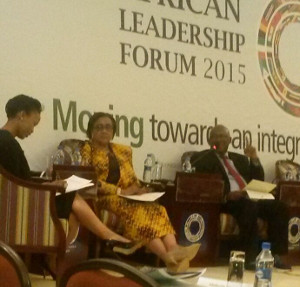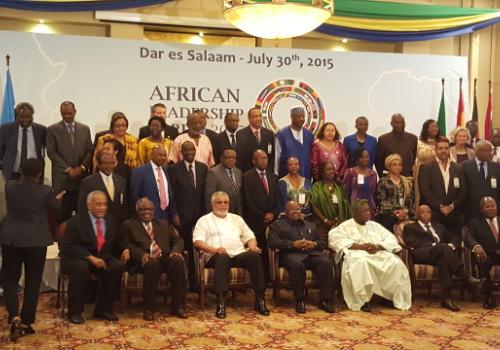The African Leadership Forum 2015 was organised by the Uongozi Institute (Institute of African leadership for Sustainable Development). The theme of the Forum was "Moving Towards an Integrated Africa: What Needs to be Done?" The workshop drew a number of high dignitaries including HE Yoweri Kaguta Museveni, the President of the Republic of Uganda, former President of the United Republic of Tanzania (HE. Benjamini William Mkapa), former President of Botswana (HE. Festus Gontebanye Mogae), Former President of Nigeria (H.E. Olusegun Obasanjo), former president of Ghana (H.E. Jerry Rawlings), Former president of Malawi (H.E. Bakili Muluzi), former President of Namibia (H.E. Hifikepunye Pohamba), former Secretary General of the OAU (Dr. Salim Ahmed Salim), the Executive Secretary of SADC (H.E. Dr. Stergomena Lawrence Tax), the Secretary General of the EAC (Dr. Richard Sezibera), Professors, scholars and leaders of various Organisations dealing with integration.
Dr. Stergomena Lawrence Tax was invited as a panelist in the session entitled: "Establishing and Strengthening Institutions to Support Integration". In her interventions, Dr Tax explained the objects of regional integration giving an example of SADC, which is to promote sustainable and equitable economic growth and socio-economic development. She went further to state that in order to realise meaningful integration, we need to define what kind of institutions we want, thereafter a number of structures within the institutions have to work together to achieve the desired results. She stated that regional institutions should aim at supporting the continental agenda and therefore there should be coherent coordination between the Regional Economic Communities and the African Union. RECs should act as building blocks towards continental integration.
Dr Tax stated that integration has to be people centred and private sector driven. Integration has to be taken to the citizens so that they can feel the benefits and importance of integration. Emphasis on public sector alone will not yield the desired results. The role of the Secretariat is to coordinate, facilitate and monitor the implementation of agreed policies. The implementers of integration programs are mainly Member States (public and private) . What has been decided at the regional level has to be reflected in national programs and budget frame, which is not normally the case at the moment. She emphasized that integration requires that the Secretariat be empowered to advise on and where necessary make strategic binding decisions and have follow up mandate. While responding to an issue regarding resources to support integration, Dr Tax was of the opinion that Resources can always be made available if there is commitment to integrate. These resources need not come from Member State coffers. Alternative sources of funding should be explored. Dr. Tax concluded her interventions by insisting that while it is important that leaders take lead in defining the integration agenda, meaningful integration can only be realised once the private sector and non state actors are fully involved in the integration process and the Secretariats of the RECs are given mandate to oversee the implementation of regional programs. She advised that it was important, going forward, that there is clear continental, regional and national linkages of both private and public actors enhanced to bring up practicable integration.
July 30, 2015


